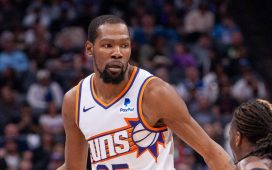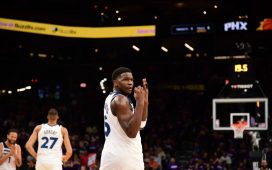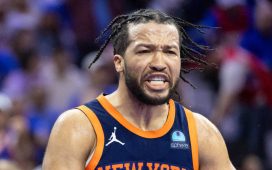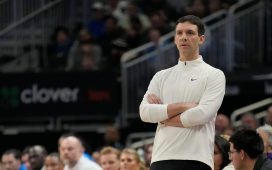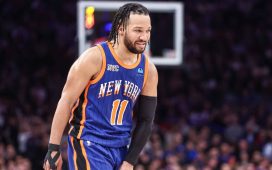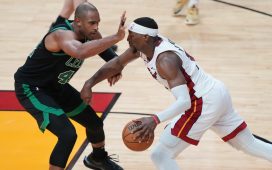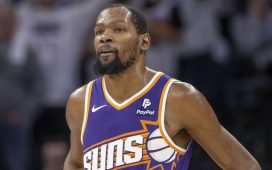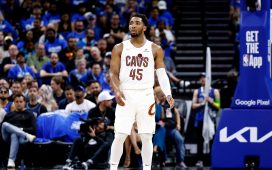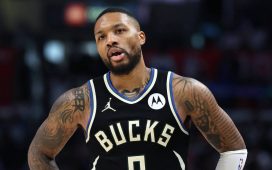The N.C.A.A., confronted with new scrutiny from the Justice Department, on Saturday all but abandoned plans for votes in the coming days that could have allowed student-athletes to profit off their fame, assuredly inflaming a debate that has drawn in governments across the country and convulsed the college sports industry.
One of the N.C.A.A.’s most powerful bodies had been scheduled to consider new standards on Monday afternoon, and some college sports executives had expected them to be finalized later in the week. But in a letter to the Justice Department on Saturday, the N.C.A.A.’s president, Mark Emmert, said he had “strongly recommended” that the association’s governing bodies wait, effectively stepping back from pledges to lawmakers and others that college sports leaders would act this winter on the issue known as name, image and likeness.
“We believe, as courts have regularly held, that our current amateurism and other rules are indeed fully compliant,” Emmert wrote to an assistant attorney general in a letter obtained by The New York Times. “Whenever we consider revisions to the rules, however, we of course receive input from many interested parties, and we welcome your invitation to consult with the department so that we can hear and fully understand its views as well.”
Emmert’s advice will almost certainly be heeded and extend an issue that was consuming the N.C.A.A. before the coronavirus pandemic took hold across the United States and upended college sports. The existing business model of collegiate sports does not allow student-athletes to be compensated beyond the cost of attendance. That approach has gone largely unchanged even as college sports ballooned into a multibillion-dollar behemoth, and has been the target of increasing furor and focus from regulators, Congress, state legislatures, the courts and even from some athletes and coaches.
In response to that pressure — primarily in the form of laws from California, Florida and a handful of other states — the N.C.A.A.’s Division I Council had planned to consider proposals to allow student-athletes to be paid by companies for the use of their name, image or likeness.
The proposals have certain limits and would, for example, forbid students from promoting sports betting. They would also allow colleges and universities to block agreements between players and companies if they conflict with “existing institutional sponsorship arrangements” and require students to disclose their name, image and likeness “activities to an independent third-party administrator” — provisions that prompted concerns among supporters of new rights for student-athletes.
Still, the ideas had emerged from months of private deliberations among college sports executives, who had long fretted over legislation in America’s statehouses that challenged the N.C.A.A.’s approach. Some changes by the N.C.A.A., some university leaders hoped, could perhaps steer the association away from deeper political turmoil.
A Florida law to expand student-athlete rights is scheduled to take effect this summer, and the California measure that in 2019 jump-started the N.C.A.A.’s debate is currently planned to come into force in 2023. (The author of the California measure has proposed having the state’s law take effect as early as Aug. 1 of this year, a month after the Florida statute.)
Even before the Justice Department aired its misgivings about the proposals on Friday, in a letter first reported by USA Today, some of the most influential figures in college sports, including Greg Sankey, the commissioner of the Southeastern Conference, had suggested that N.C.A.A. officials consider delaying a vote. Recent and imminent machinations in Washington, they reasoned, could reshuffle the debate once more.
Perhaps most crucially, the United States Supreme Court recently agreed to hear the association’s appeal in an antitrust case related to benefits for student-athletes. The shifting balance of power in Washington is also certain to affect deliberations over a possible federal law governing college athletics.
Senator Cory Booker, Democrat of New Jersey, for instance, in December announced a proposal to give student-athletes a share of the profits in moneymaking sports like basketball and football. A Republican-led bill that surfaced in the Senate last year would have granted the N.C.A.A. an antitrust exemption.
But for all of the bubbling interest in Washington — and college sports issues have bubbled for years in the capital — it is not clear how urgently either the House or Senate will consider any of the measures, much less advance them.
Although name, image and likeness issues have drawn the most consistent attention from government officials, Emmert also recommended delaying consideration of a plan to drop a one-year wait time and allow athletes in five sports — baseball, basketball, football and men’s ice hockey — to play immediately after transferring between schools. The plan, supporters contend, would “create a uniform, equitable approach to transfer eligibility in all sports.”
